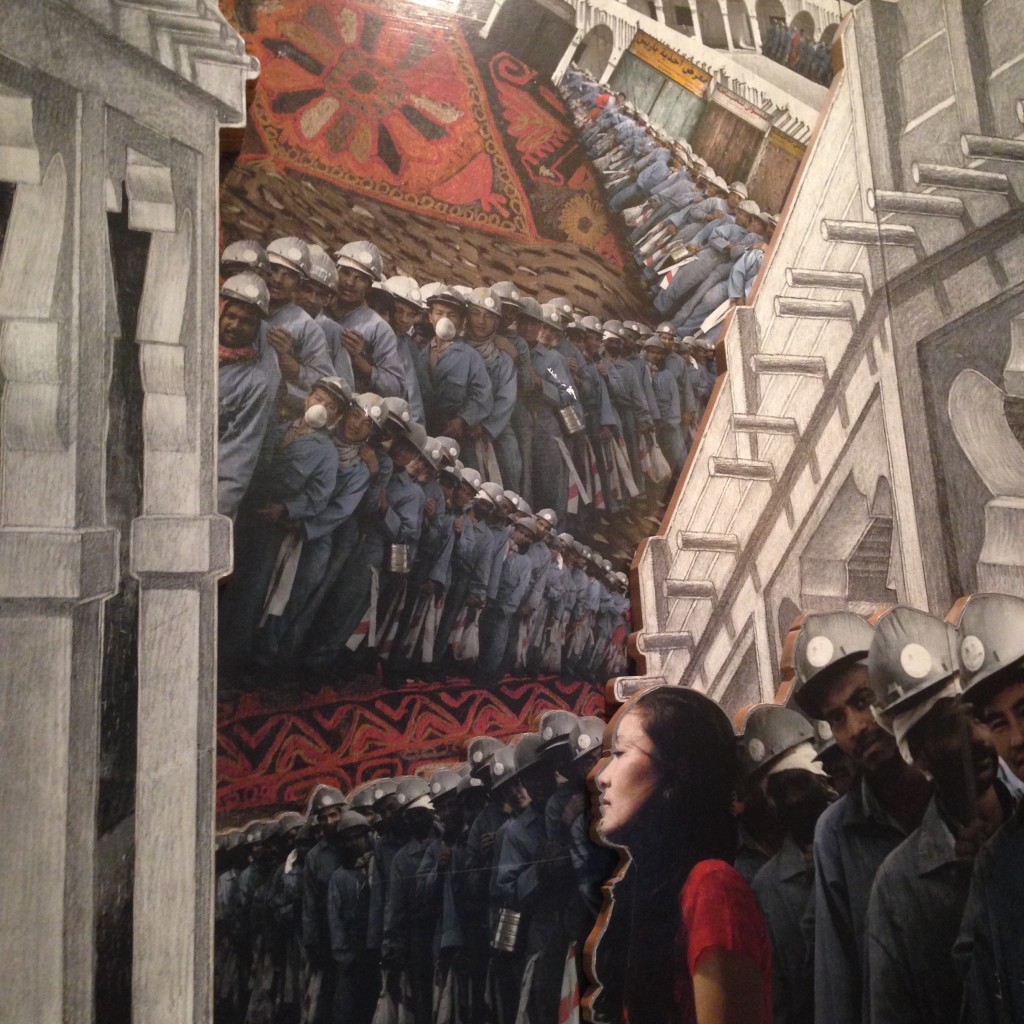Why should intimacy, and even family life, be reserved for the privileged nationalities and financially affluent?
Qatar, like all GCC countries, makes it virtually impossible for the spouses and partners of low-income migrant workers to accompany them for the duration of their contract. Over an extended period of time devoid of affection and intimacy, desire manifests, ever so intense. The situation isn't made any easier when you look around and all you see are other couples of privileged nationalities, strolling side by side, holding hands, or having a meal together, enjoying each other's company. After a magical day or night out, they retreat to their homes, where they enjoy the luxury of privacy.

A section of the mural 'Between memory, desert and sea' by Doug Cooper, at the Carnegie Mellon University in Qatar.
For the rest of us, our options are limited. It all begins with the ratio of men to women, which if I'm not wrong, is at 3:1, and in the age group of 25-35 years, it is 4:1. From the jump, it's highly competitive.
For low-income migrant workers, it's not easy to interact with people from one’s own country as we are either at work or in our accommodation. And with restrictions imposed on us (men) to visit certain public places like beaches, malls, parks, there aren't many options left. The best chance you have to meet people is at work (depending on where you work), or while shopping (depends on the supermarket or mall), or from what I've heard, the Corniche (depends on whether restrictions are in place).
Interracial dating is very rare. It happens more as you move up the pay grades and nationality ladder.
With such limited options, most interaction takes place online, in country-specific Facebook and WhatsApp groups. Here, people can share their experiences in the Gulf, post inspirational content, make light of not-so-ideal situations – including sexual frustration, challenges at the workplace, nostalgia, and generally just get things off their chest among fellow countrymen. Here is where people get to connect, and if they click, contact information is exchanged and plans to go out are made.
Now, I would like to say that 'going out' involves casual strolls, a movie or a romantic dinner, but that would be BS. 'Going out' invariably refers to purchasing privacy temporarily, in one of the many cheap hotels around Doha. Time flies in these types of situations, and every moment counts because you never know when you'll get another chance. During this getaway, you are even entitled to a treat in the form of fast food delivery – sort of a reward for perpetually slaving away at your job, and the mundane routine that comes with it. For a fleeting moment of normalcy, the room, transport and food may set you back by QR400-500.
If you aren't lucky enough to have your off days aligned with your newfound partner, or if you're short on funds, or if you aren't willing to spend that much for less than a day’s worth of companionship, then the next best thing is texting.
This is just my theory, but here in Qatar, deprivation of intimacy reverts us to animalistic behaviour. I'll probably have to consult with an anthropologist, but humans generally need to first develop a bond with their partners, get to know each other first, see if they are well-suited for the long term. But here, that human aspect has all but been erased, giving way for our carnal desires to take centre stage. The (perceived) inconvenience of sentiment done away with. Or maybe it's just me.
I'm not exactly in the best position to give recommendations on how to make it easier for migrant workers to have a real-life, but I'll say one or two things anyway.
Qatar shouldn't impose any restrictions on "bachelors" visiting public areas, but this seems impractical. Once the gentlemen show up, two out of a lot of possible outcomes are guaranteed. They will most likely be targets of racial discrimination (direct and indirect, passive and active) and the more privileged nationalities will gradually, over time, boycott/ not show up to these places on account of it being 'accessible' to all. Maybe then, make the societies more inclusive, which will require going back to the drawing board of urban planning and wage structures.
Low-income or not, everyone has specific needs to be met. So, I ask again, why is a ‘normal life’ for the privileged alone?
(Again, impractical. Just imagine a family of South Asians and Africans, having a barbecue on the same beach as Qatari, British and American families.)




